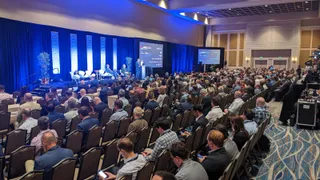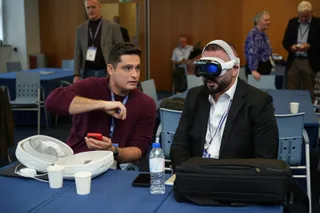New VR Training Helps Officers See Different Perspectives
Contact Our Team
For more information about how Halldale can add value to your marketing and promotional campaigns or to discuss event exhibitor and sponsorship opportunities, contact our team to find out more
The Americas -
holly.foster@halldale.com
Rest of World -
jeremy@halldale.com

Axon’s Virtual Reality (VR) Simulator Training, which provides immersive VR training that helps officers develop critical thinking and de-escalation skills and build community trust, is now available. Phoenix PD is one of the first agencies to deploy this training to better prepare officers for real-life situations in the field.
With Simulator Training, trainers and trainees no longer need to be in the same location for training to occur. Simulator Training can be deployed in any environment and allows officers to train as often as they like from anywhere, even remotely. Simulator Training aims to increase the frequency in which officers conduct skills and de-escalation training through immersive, real-life scenarios that feel real, both physically and mentally, and can be completed in 10-20 minutes before or after a shift. The platform can also be used to analyze an officer's current performance and inform future training for that individual.
"With this new VR training, we've reduced the cost and time that it takes to get our officers the training they need to perform at their best," says Phoenix Mayor, Kate Gallego. "I've experienced the VR training, and it was amazing to see the same incident from different perspectives. The training will help our officers gain confidence and insight as they respond to our diverse communities."
The Axon VR Training platform is made up of three core components including: Axon Academy, community engagement training and simulator training.
Axon Academy houses a library of supplemental e-learning content and training materials designed to strengthen the skills learned in the Community Engagement and Simulator Training scenarios. For trainers, after-action reports stored on Academy provide performance and progress metrics, insight into an officer's decisions, and new opportunities for coaching and program development.
Community Engagement Training focuses on developing skills, empathy and communication for engaging with individuals in scenarios involving mental health, trauma, peer intervention and more. Through these experiences, trainees get to understand the perspectives of both the officer and the civilian and see how different modes of communication can result in de-escalation, which can influence calls for service.
Simulator Training offers two variations. In the Firing Range – Basic scenario, trainees learn safe and effective deployment of weapons. Trainees learn to operate TASER 7 energy weapons and replica training firearms in VR within an indoor range environment, then practice their skills on stationary targets from varying distances to improve accuracy, speed, tactical knowledge and critical thinking skills.
In the Firing Range – Intermediate scenario, trainees deploy the TASER 7 energy weapon from various distances on moving subjects in an outdoor, nighttime setting. This fast-paced exercise helps trainees utilize safety features, recognize proper spread and probe placement on moving subjects, manage clothing disconnects, and achieve higher effectiveness when deploying TASER cartridges.
A recent study from the National League of Cities looked at a three-month period in which over 85 officers at Phoenix PD's South Mountain Precinct went through nine of Axon's Community Engagement Modules in VR. The study found that 81.4% of participants said that at least one of the VR training modules was effective in preparing them to adapt their approach to a call. Additionally, 59% of participants found that at least one of the modules had encouraged them to see things from another perspective.
Combining the HTC VIVE Focus 3 VR headset and the VIVE Wrist Tracker from partner HTC VIVE, Axon VR provides an all-in-one, portable platform that's simple to deploy and use, with no extraneous hardware, time or space constraints. The VR training provides connectivity for both in-person and remote experiences, creating an on-demand platform that can be accessed anytime.


